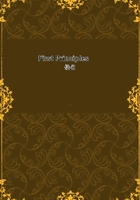
第12章
We attempt to escape from this apparent contradiction, by introducing theidea of succession in time. The Absolute exists first by itself, and afterwardsbecomes a Cause. But here we are checked by the third conception, that ofthe Infinite. How can the Infinite become that which it was not from thefirst? If Causation is a possible mode of existence, that which exists withoutcausing is not infinite; that which becomes a cause has passed beyond itsformer limits. * * *
"Supposing the Absolute to become a cause, it will follow that itoperates by means of freewill and consciousness. For a necessary cause cannotbe conceived as absolute and infinite. If necessitated by something beyonditself, it is thereby limited by a superior power; and if necessitated byitself, it has in its own nature a necessary relation to its effect. Theact of causation must therefore be voluntary; and volition is only possiblein a conscious being. But consciousness again is only conceivable as a relation.
There must be a conscious subject, and an object of which he is conscious.
The subject is a subject to the object; the object is an object to the subject;and neither can exist by itself as the absolute. This difficulty, again,may be for the moment evaded, by distinguishing between the absolute as relatedto another and the absolute as related to itself. The Absolute, it may besaid, may possibly be conscious, provided it is only conscious of itself.
But this alternative is, in ultimate analysis, no less self-destructive thanthe other. For the object of consciousness, whether a mode of the Subject'sexistence or not, is either created in and by the act of consciousness, orhas an existence independent of it. In the former case, the object dependsupon the subject, and the subject alone is the true absolute. In the lattercase, the subject depends upon the object, and the object alone is the trueabsolute. Or if we attempt a third hypothesis, and maintain that each existsindependently of the other, we have no absolute at all, but only a pair ofrelatives; for coexistence, whether in consciousness or not, is itself arelation.
"The corollary from this reasoning is obvious. Not only is the Absolute,as conceived, incapable of a necessary relation to anything else but it isalso incapable of containing, by the constitution of its own nature, an essentialrelation within itself; as a whole, for instance, composed of parts, or asa substance consisting of attributes, or as a conscious subject in antithesisto an object. For if there is in the absolute any principle of unity, distinctfrom the mere accumulation of parts or attributes, this principle alone isthe true absolute. If, on the other hand, there is no such principle, thenthere is no absolute at all, but only a plurality of relatives. The almostunanimous voice of philosophy, in pronouncing that the absolute is both oneand simple, must be accepted as the voice of reason also, so far as reasonhas any voice in the matter. But this absolute unity, as indifferent andcontaining no attributes, can neither be distinguished from the multiplicityof finite beings by any characteristic feature, nor be identified with themin their multiplicity. Thus we are landed in an inextricable dilemma. TheAbsolute cannot be conceived as conscious, neither can it be conceived asunconscious; it cannot be conceived as complex, neither can it be conceivedas simple: it cannot be conceived by difference, neither can it be conceivedby the absence of difference: it cannot be identified with the universe,neither can it be distinguished from it. The One and the Many, regarded asthe beginning of existence, are thus alike incomprehensible.
"The fundamental conceptions of Rational Theology being thus self-destructive,we may naturally expect to find the same antagonism manifested in their specialapplications. * * * How, for example. Can Infinite Power be able to do allthings, and yet Infinite Goodness be unable to do evil? How can InfiniteJustice exact the utmost penalty for every sin, and yet Infinite Mercy pardonthe sinner? How can Infinite Wisdom know all that is to come, and yet InfiniteFreedom be at liberty to do or to forbear? How is the existence of Evil compatiblewith that of an infinitely perfect Being; for if he wills it, he is not infinitelygood; and if he will it not, his will is thwarted and his sphere of actionlimited? * * *
"Let us, however, suppose for an instant that these difficultiesare surmounted, and the existence of the Absolute securely established onthe testimony of reason. Still we have not succeeded in reconciling thisidea with that of a Cause: we have done nothing towards explaining how theabsolute can give rise to the relative, the infinite to the finite. If thecondition of causal activity is a higher state than that of quiescence, theAbsolute, whether acting voluntarily or involuntarily, has passed from acondition of comparative imperfection to one of comparative perfection; andtherefore was not originally perfect. If the state of activity is an inferiorstate to that of quiescence, the Absolute, in becoming a cause, has lostits original perfection. There remains only the supposition that the twostates are equal, and the act of creation one of complete indifference. Butthis supposition annihilates the unity of the absolute, or it annihilatesitself. If the act of creation is real, and yet indifferent, we must admitthe possibility of two conceptions of the absolute, the one as productive,the other as non-productive. If the act is not real, the supposition itselfvanishes. * * *